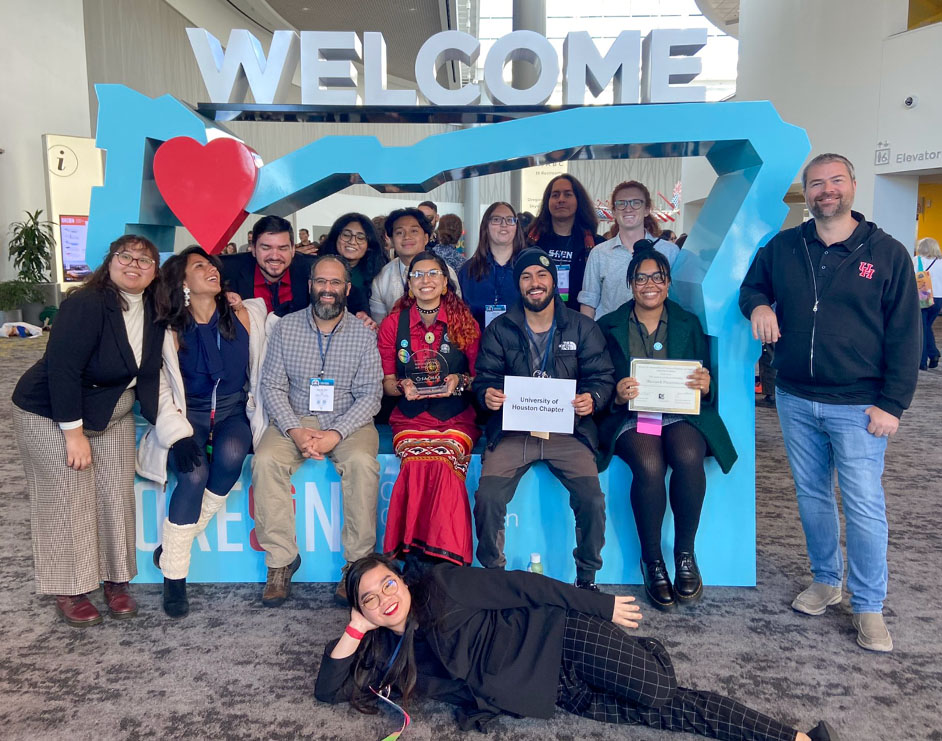Campus SACNAS Chapter Recognized as Best in the Nation for Student Programs, Community Outreach
The University of Houston chapter of the Society for the Advancement of Chicanos/Hispanics and Native Americans in Science (SACNAS UH) was recognized nationally with the 2023 SACNAS Graduate/Professional Chapter of the Year Award. The award was presented at the annual SACNAS National Diversity in STEM Conference in Portland, Oregon.

“The award affirms the strides our chapter has made and that the nation is taking notice,” said Lorissa Saiz, a Ph.D. student in cell and molecular biology and president and founding member of SACNAS UH.
“We have worked hard to promote diversity in STEM, and this award speaks to the dedication of the students and faculty who have made this chapter what it is today. We’ve reached the standard of excellence, and we want to maintain our status as the top SACNAS chapter in the nation,” Saiz said.
Nationally, SACNAS has 138 student chapters and six professional chapters, making it the nation’s largest STEM diversity organization.
Making a Mark on Diversity and Success in STEM
SACNAS UH received the Graduate/Professional Chapter of the Year Award for its commitment to diversity in STEM. The campus chapter, which is open to all UH students, was also recognized for efforts to provide opportunities in STEM to underrepresented students at UH and through outreach efforts in the surrounding community.
This is the second national award SACNAS UH has earned since its founding in 2019. In 2022, SACNAS UH earned the Role Model Chapter: STEM Diversity Award.
SACNAS UH recognizes the need for diversity in STEM. It works to promote initiatives that ensure all groups are equally represented in this field. The chapter also acts as a support system for underrepresented STEM students at UH, especially freshmen.
The organization pairs both undergraduate and graduate students with experienced mentors who provide guidance, support and encouragement. This mentorship not only helps students navigate their academic journey, but also fosters a sense of belonging in STEM fields.
Members of SACNAS UH also engage with faculty to ensure that underrepresented students are given opportunities to thrive in STEM education in the form of scholarships.
“Having different people with different perspectives is important to science,” said Martín Nuñez, SACNAS UH faculty advisor and associate professor of biology and biochemistry. “We need people who think differently to make new discoveries and SACNAS UH strives to promote this diversity.”
Encouraging Students Through Cultural Events and Community Outreach
“We try to host events that focus on cultural expression and outreach events in the community,” said Marcela Strane, a Ph.D. student in environmental engineering research and SACNAS UH vice president.
These gatherings provide a safe space for networking, sharing experiences and building lasting relationships.
Outreach initiatives are an important aspect of SACNAS UH. The chapter works with Houston-area public schools to address STEM challenges and to encourage students who express interest in a STEM path.
“We do a lot of work with Houston ISD in which we will go out to high schools and middle schools and encourage students to consider a path that includes STEM in college,” said Jennifer Ruiz, a biology and biochemistry graduate student focused on ecology and graduate outreach officer for SACNAS UH. “We let them know that diversity is important to the future of STEM, as well as careers in science. They can make a difference.”
Focused on Continued Growth
The SACNAS UH chapter has approximately 300 members and continues to grow. Membership encompasses UH undergraduate students, graduate students, post-baccalaureate students and alumni.
NSM faculty also lend a hand to the chapter’s success. In addition to Nuñez, Ricardo Azevedo, professor of biology and biochemistry, and Greg Morrison, associate professor of physics, serve as faculty advisors. Tony Frankino, associate professor of biology and biochemistry and departmental associate chair for undergraduate affairs, and biology and biochemistry chair and professor Amy Sater serve as co-advisors.
As SACNAS in Texas grows, Saiz has proposed a regional conference to supplement the national conference.
“It could open the door to more collaboration with other universities in Houston and across Texas,” said Strane.
- Chris Guillory, College of Natural Sciences and Mathematics